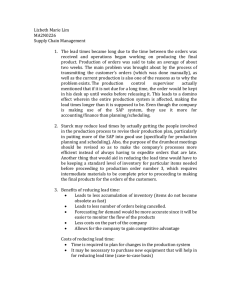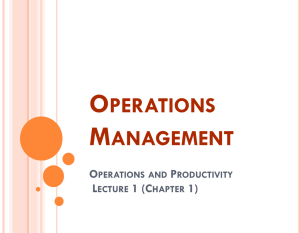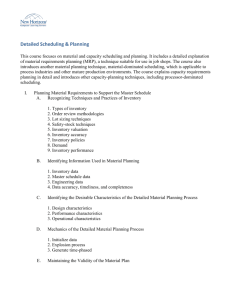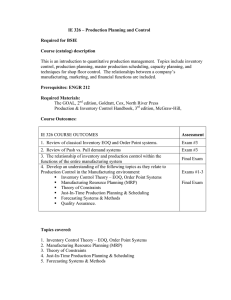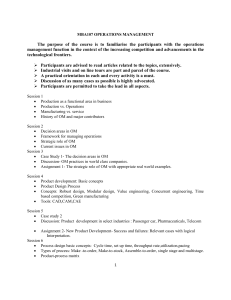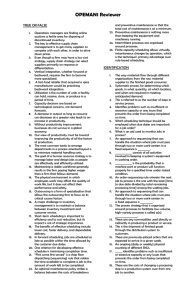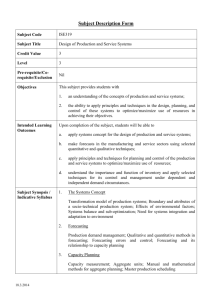Linear Programming (Optimization)
advertisement
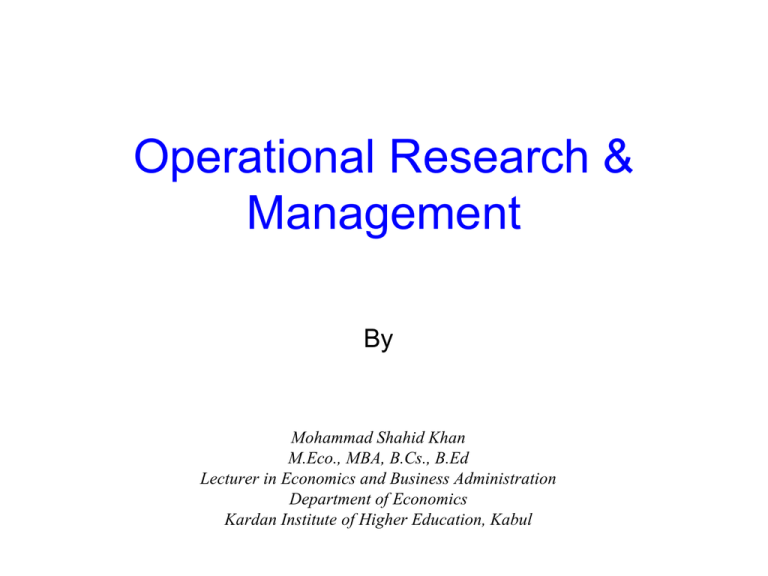
Operational Research & Management By Mohammad Shahid Khan M.Eco., MBA, B.Cs., B.Ed Lecturer in Economics and Business Administration Department of Economics Kardan Institute of Higher Education, Kabul What is Operations? A function or system that transforms inputs into outputs of greater value. An operation is a series of tasks that are routine, repetitive and ongoing throughout the life of an organization. Industrial Sector Agriculture Sector Transport Sector Banking Sector Operations Construction Communication Sector Computer Design and Working Airlines Business Army Projects Examples of Operations in Various Sectors Industrial Manufacturing Telecommunication • Scheduling production • Process control • Network design • Traffic routing • Base station location Logistics • Distribution network • Center location • Transportation plan Air Line Industry • Plane scheduling • Crew scheduling Why Focusing on Operations? Maximize Production Capacity Minimize Cost of Production Increase the Speed of Operations Increase the efficiency of the operations Increase the Quality of the operations and product Bring Flexibility in the operations Gain greater Control over the operations Operations Research & Management? World War II : British military leaders asked scientists and engineers to analyze several military problems Deployment of radar Management of convoy, bombing, antisubmarine, and mining operations. The result was called Military Operations Research, later Operations Research 6 Operations Research & Management? Today: Operations Research and Management mean “the use of mathematical models and statistical techniques in providing guidelines to managers for making effective decisions within the state of the current information to reach a proper decision.” Operational Research: "OR is a scientific method of providing executive departments with a quantitative basis for decision regarding the operations under their control " "OR is concerned with scientifically deciding how to best design and operate man-machine systems, usually under conditions requiring the allocation of scarce resources". Operational Research is the application of the methods of science to complex problems arising in the direction and management of large systems of men, machines, materials and money in industry, business, government and defense. The purpose is to help management determine its policies and actions scientifically. OR…continued "OR is the application of scientific methods, techniques and tools to the problems involving the operations of systems so as to provide those in control of the operations with optimum solutions to the problem". Characteristics: Use of Scientific Methods Provide quantitative basis for decision making Requires Construction of Model Interdisciplinary Team work Require the use of Computer applications Scope of Operations Research &Management Operations Research: Linear programming: Linear Programming is a mathematical techniques which is concerned with the efficient allocation of limited resources to achieve the desired objectives. max P x1 2 x2 3 x1 2 x2 10 x1 2 x2 3 x1 0, x2 0 Decision Analysis: Bringing efficiency in decision-making especially when uncertainty and risk is involved is a major area of operational research. We will study Decision Tree with EMV approach to arrive at an optimal decision in the case of risk and uncertainty. Operations Management: Inventory Management: Managing the Raw Material Inventory as well as finished goods inventory is a major decision of business operations. We will study some models and mathematical techniques to effectively manage the inventory to increase productivity and control cost. Total Quality Management: Total Quality Management is a concept introduced by Edward Deming in Japan. We will discuss how quality control and quality assurance can reduce the operations cost and can increase the efficiency and productivity of the operations. Statistical Process Control: In this chapter we will discuss statistical charts that will help us in controlling the operations and increasing their efficiency.
